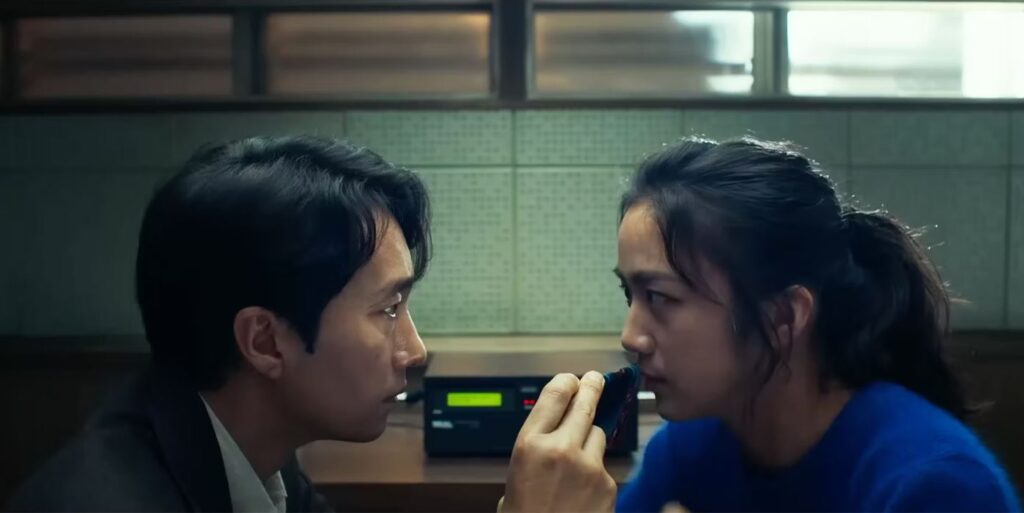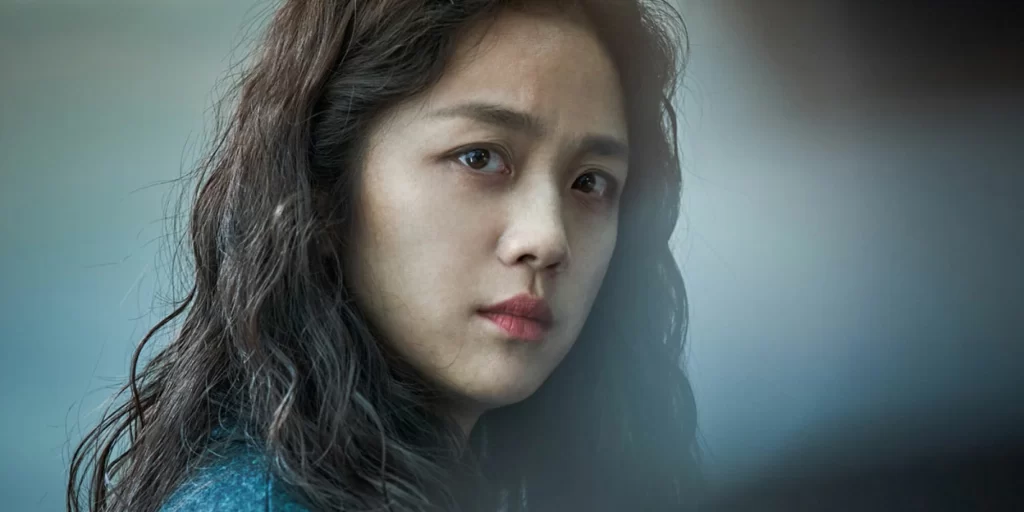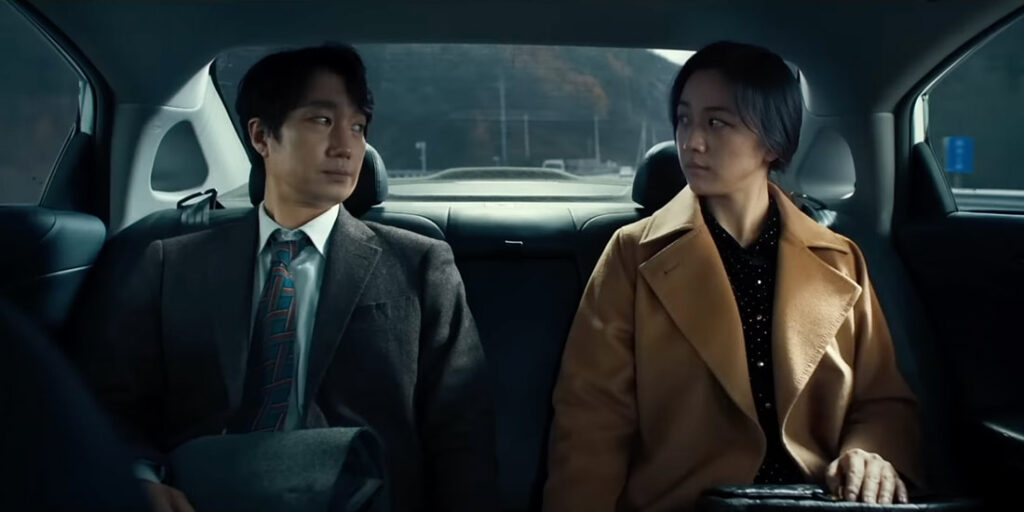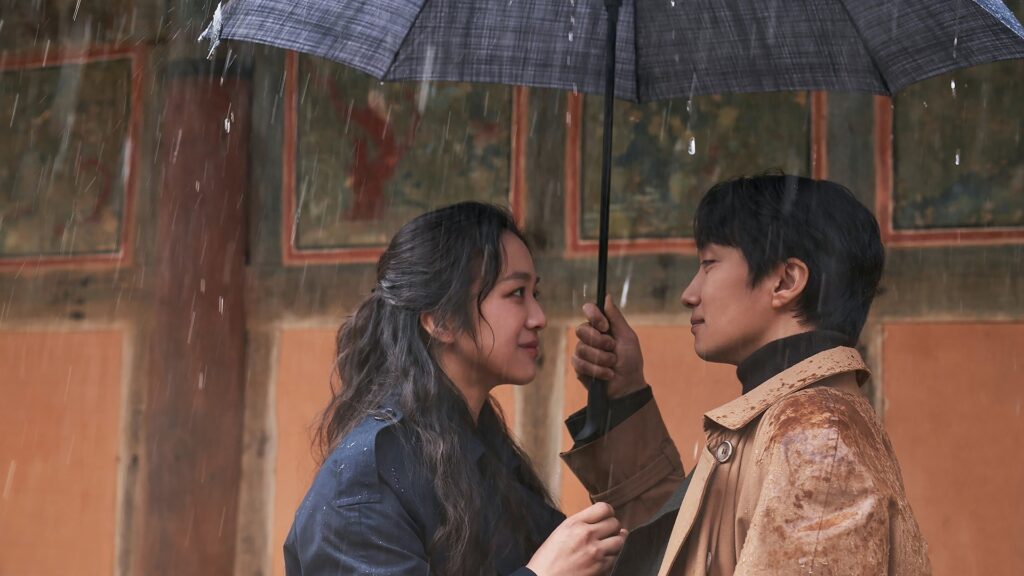
He’s a good cop: smart, confident, decisive. He’s looking down at a fresh corpse on a coroner’s table, asking the right questions, making the proper deductions. But when the woman enters the room, he glances up from the body, and for a split second his breath catches in his throat, and his typically impassive countenance is replaced with astonishment. He recovers his poise quickly enough—after all, he’s a professional—but that single skipped beat of his heart foreshadows a future of desire and ruin. He isn’t in control anymore; she is.
This is an early scene from Park Chan-wook’s Decision to Leave, but it’s also the latest descendant in a long lineage of Meaningful Looks; it’s Fred MacMurray eyeing Barbara Stanwyck’s bare shoulders in Double Indemnity, and Jimmy Stewart staring across a restaurant at Kim Novak in Vertigo, and Russell Crowe watching Kim Basinger stroll into a liquor store in L.A. Confidential. It firmly plants the movie in the heightened universe of film noir, with its hot-blooded gumshoes and coolly captivating femme fatales, its furtive schemes and dastardly crimes. Yet because Park is an uncommonly gifted stylist, nothing about his thrilling new picture feels imitative or traditional. Noirs were always sexy, but they’ve never been quite this voluptuous.

Except, perhaps, for The Handmaiden, Park’s prior feature which transformed a tawdry tale of deception and predation into a lush and swooning story of feminine empowerment. That film took place in the 1930s, and while Decision to Leave finds its director returning to the present—smartphones are crucial here, as both plot points and vehicles for dialogue—its sensibilities remain pleasingly classical. This is a movie of big, bold emotions, with a gloriously sensual aesthetic to match.
It takes a bit of time before Park brings the considerable weight of his artistry to bear on Decision to Leave, which in its opening scenes suggests a straightforward police procedural. Fed up with bureaucratic red tape, two detectives—the dogged and unflappable Hae-joon (Park Hae-il), and his younger and more impetuous partner, Soo-wan (Go Kyung-Pyo)—resolve to apprehend an elusive murder suspect. Their rugged rapport—when Soo-wan chastises his mentor for failing to sleep on account of undertaking too many stakeouts, Hae-joon counters that he goes on stakeouts because he can’t sleep—recalls the riveting cop drama Memories of Murder, in which Park Hae-il played a key role, and which was directed by Park Chan-wook’s countryman, Bong Joon Ho. But Hae-joon soon finds himself drawn to a different case, that of a middle-aged mountain climber who apparently fell to his death; naturally, he insists on recreating the ascent himself, leading to the hilarious image of him striding up a cliff face via mechanical rope with Soo-wan helplessly strapped to his back. As investigative practice and cinematic custom require, he interviews the victim’s wife, who proves to be the young and beautiful Seo-rae (Tang Wei), and whose striking emergence inspires Park to rev his creative engine into overdrive.
Critics are fond of repeating the maxim that film is a visual medium as opposed to a plot delivery system. Few directors grasp this truth more than Park, to the point where it’s difficult for words to convey the breadth and force of his execution here. I’m not speaking in terms of pure technique. Sure, Decision to Leave’s raw materials are exquisite—of particular note are Kim Sang-beom’s supple editing and Kwak Jung-ae’s gorgeous costumes—but its real triumph lies in Park’s breathtaking visual imagination.

Scenes in this movie don’t so much unfold as spill into one another, washing over you with their texture and grace. It’s a bravura approach that dovetails with the film’s themes of passion and obsession. As Hae-joon grows increasingly besotted with Seo-rae—she initially disarms him with her coyness (she repeatedly apologizes for her “insufficient” Korean, which is far smoother than his Chinese), then hooks him with her calculated indifference—he begins staking out her apartment, his brain conjuring interactions and conversations. Park stages these ruminations with a dream-logic that combines literalism, voiceover, and fantasy. At times, Hae-joon and Seo-rae seem to be occupying the same room; in the next moment, we see him in his car, peering through the windshield like a hungry voyeur. The effect is that we’re never quite sure what’s really happening versus what Hae-joon is envisioning, and while you might think such a tactic would be enervating, it’s instead enveloping, bringing us inside our hero’s heady headspace.
Park doesn’t deploy this method exclusively in the service of articulating Hae-joon’s unconsummated yearning. Even the more genre-heavy elements in Decision to Leave tend to transpire in a liminal space between continuity and montage, with scenes overlapping one another rather than proceeding sequentially. There are moments of excitement and violence, but the movie features few conventional set pieces, preferring to dispense information and action simultaneously. (The exception is a kinetic knife fight, in which Hae-joon shields himself with a chainmail-like glove; poor Soo-wan can’t even participate, having previously crumpled to the ground in exhaustion during a lengthy foot chase.) This defies our expectations—rather than letting the hunt for a killer build to the anticipated payoff, Park blends the pursuit and the resolution together, lending the outcome a glaze of tragedy—yet the editing rhythms are fluid rather than jagged. Even ostensibly simple scenes sport intriguing images; when Hae-joon makes love to his neglected wife (Lee Jung-hyun, tidy and tart), his arm mirrors that of a previously glimpsed X-ray, while frequent text-message exchanges are embellished, with superimposed faces looming in the screens of devices like electronic ghosts.

Park’s showmanship is so intoxicating, it manages to elevate Decision to Leave’s story, which at its core is less spellbinding than disorienting. The screenplay, with its typical (if unpredictable) twists and turns, is blurry and overplotted. (Park penned the script with his frequent writing partner Jeong Seo-kyeong; this is their fifth collaboration.) There are murdered husbands, suspicious (and suspecting) wives, complicit grannies, vengeful assassins, color-changing dresses (and how!), swapped cell phones, and a startling time jump. It’s a lot to process, and while Park strives to harness all of these elements into a devastating swirl, the story’s busyness mitigates its power.
The Handmaiden, which remains Park’s masterpiece, similarly trafficked in thorny narrative machinations, but it streamlined them with an elegance that matched its rapturous craft. It’s unfair to chastise Park for failing to repeat that feat in Decision to Leave, or even to accuse him of sacrificing character in favor of panache. The movie’s last act approximates a grandly emotional finale, complete with a long-awaited kiss; like everything else in the picture, it’s sumptuously staged and reasonably moving, even if it’s not quite as wrenchingly romantic as it’s meant to be.

Which, again, is a fairly high bar. For their part, the lead actors capably amplify the film’s spirit of ardency. Park Hae-il locates the zone between brooding and smoldering, playing Hae-joon as a self-aware man who recognizes the depths of his obsession and still can’t help succumbing to it. And Tang, who has previously sizzled for both Ang Lee (in Lust, Caution) and Michael Mann (in Blackhat), is almost indecently alluring, even as she sprinkles in a pinch of sadness that underlies her noirish glamour.
And we certainly shouldn’t discount that. With its eye-popping imagery and smashing costumes—in addition to outfitting Tang in a shimmering dress that Hae-joon describes as either blue or green depending on the light, Park also showcases her in a sweater whose shade might be labeled “thunderbolt blue”—Decision to Leave is an exhilarating sensory experience. It’s been nearly two decades since Park broke out with Oldboy, and while he’s hardly abandoned the grisly shocks which characterized that provocation, he’s nonetheless matured enormously. He still engages with deep, primal feelings—love and lust, anguish and vengeance, anger and despair—but now, with ravishing skill and fearless invention, he transforms their intensity into beauty.
Grade: A-
Jeremy Beck is the editor-in-chief of MovieManifesto. He watches more movies and television than he probably should.
